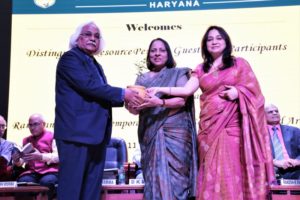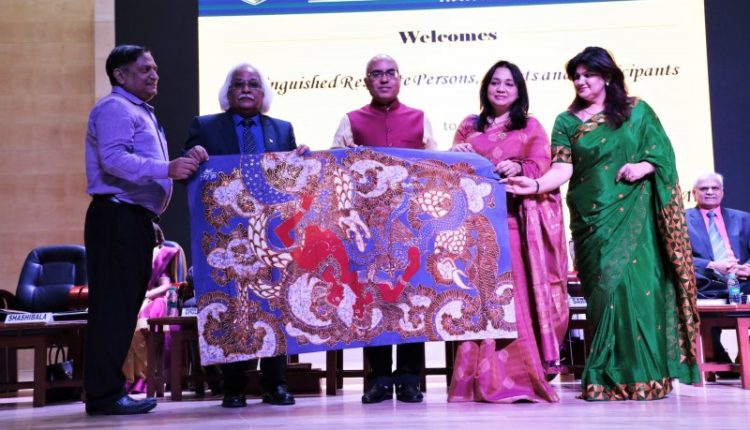Researchers, scholars, educationists from across Southeast Asia converge at Amity University, Gurugram to discuss Ramayana in the Contemporary Context
NEW DELHI. India’s legendary epic Ramayana brought the greatest of minds and visionaries in the field of art, culture, literature, education, academics, and history together from Sri-Lanka, Thailand, Malaysia, and India to discuss the impact of Ramayana in the modern-day lives of people across the world.
The occasion was the International Seminar “Ramayana in the Contemporary Context: Science, Culture and Art”, the Amity University, Haryana, Amity School of Liberal Arts, is organizing in collaboration with the Ayodhya Research Institute, Department of Culture, Government of Uttar Pradesh on October 10 – 11 in Gurugram.
While addressing the gathering the chief guest of the seminar Akhilesh Mishra, Director General, Indian Council for Culture Relations (ICCR), New Delhi said, “Ramayana is a source of inspiration for all people under all conditions of life. The message of Ramayana is timeless – which is self-sacrifice for upholding of values. Lord Rama is an embodiment of dharma and all must conduct as per their dharma”
“ICCR organizes ‘International Ramayana Festivals’ in which the maximum number of delegates from Muslim dominated countries of South East Asia participate, ”said Mishra adding that a ruler should ensure peace, prosperity, safety, and security for all as Lord Rama’s Ramrajya.
 The 2-day International Seminar is also aimed at discussing and deliberating upon these issues and, thus, revisit the Ramayana to explore its more profound meaning and to revitalize the present-day society and the governing principles in a democracy like India.
The 2-day International Seminar is also aimed at discussing and deliberating upon these issues and, thus, revisit the Ramayana to explore its more profound meaning and to revitalize the present-day society and the governing principles in a democracy like India.
While discussing the importance of the Ramayana, Dr. Yogendra Pratap Singh, Director, Ayodhya Research Institute, Department of Culture, Government of Uttar Pradesh, India said, “Rama never said NO in his life, even for his marriage or while going to banvas (exile)”.
Dr. Singh further said that having traveled most of the South East Asian countries, he is never asked the question ‘whether Ram was born or it is a myth?”, but in India, I face such question’. “Even in Iraq, a sculpture of Lord Rama and Hanuman is found which is four thousand years old. The entirety of human values which are found in Lord Rama is not there in Budha or Krishna”, concluded Dr. Singh.
Dr. Singh also praised Dr Sanjana Vij Assistant Professor and Chief Coordinator of the program who, he said, was instrumental in organizing this seminar.
Dr. Saroj Bala, Director, Institute of Scientific Research on Vedas (I-SERVE), Gurugram who has authored a book ‘Ramayana Retold with Scientific Evidences’ told the audience that Valmiki’s Ramayana was first narrated by Love & Kush in Ayodhya, which brought tears to Ayodhyavasis over the fate of Sita. She further added that Valmiki Ramayana is a combination of Science, Arts, and Culture which is the theme of the present conference.
With the coming generations, certain questions add up to the legacy of this tale which needs to be discussed, debated and talked about. Some of these are, Are the great epics like ‘Ramayana’ being read in the present times by the current generation? Do their characters inspire the readers as they used to do in earlier times? To what extent have legendries like Valmiki, Kambhan and Tulsidas have reached the hearts of the people? Did new technology creations such as television serial “Ramayana” by Ramanand Sagar play a role in making such texts reach out to the common man?
Prof. (Dr.) P B Sharma, Vice-Chancellor, Amity University Gurugram in his thematic address said, “Triumph of truth prevails over untruth. Strength, Discretion, Power and well being of others should be our motives to lead our lives as advised in Ramayana”.
“The objectives of the seminar is to develop an interest in Indian values, culture & traditions, to understand Ramayana in the contemporary context and to analyze its relevance today, to enhance the awareness of the participants, and contribute to their intellectual growth and holistic development, to generate understanding among participants on the various versions of Ramkatha and its effect on family relations and family values,” added Prof (Dr.) P B Sharma.
In her address, Prof. (Dr.) Padamakali Banerjee, the Pro-Vice-Chancellor & Dean Academics, Amity University, Haryana said Amity was one of the firsts in the country to start with the flexibility in the curriculum in terms of choice based credit system, which later on became a part of all universities by the UGC, and Amity also started Sanskrit and Indic studies last year.
While deliberating on the 2-day seminar, Prof. (Dr.) Banerjee said that unfortunately when Ram was searched on the google search engine, what people got Random Access Memory, and one needed to type Rama to get a little bit of Ramayana.
“The big question is, how to change this when Ramayana is an integral part of our lives? Ram’s life was full of disaster. and there is a lot to learn from him. Just before he became the king, he had to go to banvaas (exile). If you look at the disaster, and how he meandered through the life path, there is a message for youngsters. The chaos and change they are going to witness in their lives in India and abroad, especially in the next 10-20 years, they need that resilience from Ram,” said Prof. (Dr.) Banerjee.
Ghulam-Sarwar Yousof, Cultural Centre, University of Malaya, Kuala Lumpur, Malaysia, Ms. Anita Bose, Artist, Author, & Guide of National Museum , Bangkok, Thailand, Dr. E.G.W.P. Gunasena, Dept. of Languages, Cultural Studies and Performing Arts, University of Sri-Jayawardenepura, Gangodawila, Colombo, Sri-Lanka, Ms W.M.A Damayanthi, Faculty, Department of Indian & Asian Dance ,University of the Visual and Performing Arts, Colombo, Sri-Lanka also spoke on the occasion.
Dr. DK Modi, Chancellor, Dr. KN Modi University and Dr. RK Khandal, former Vice-Chancellor of UPTU currently President (R&D) of Glycon India were also present on the occasion.
Dr. Khandal exalted the young students present to emulate universal values of the righteous way of life, personal integrity, professional morality and good governance of Lord Rama to create India of our dream.
Prof. Shashibala, Dean, Centre for Indology, Bharatiya Vidya Bhavan, Delhi, Dr. Rachna Bimal, Satyawati College, Delhi University & Free Lance Journalist (Hindi), Prof. S.P. Gautam, Member, M.P. Public Service Commission, Indore, India, Prof. Dipti S. Tripathi, Former Head- Department of Sanskrit , Delhi University & Former Director- National Manuscript Mission, Ministry of Culture, Govt of India, Prof S K Jha, Director, ASLA, Dr Sanjana Vij, Ass. Prof Ali Tariq and students were also present on the occasion and addressed the audience.


